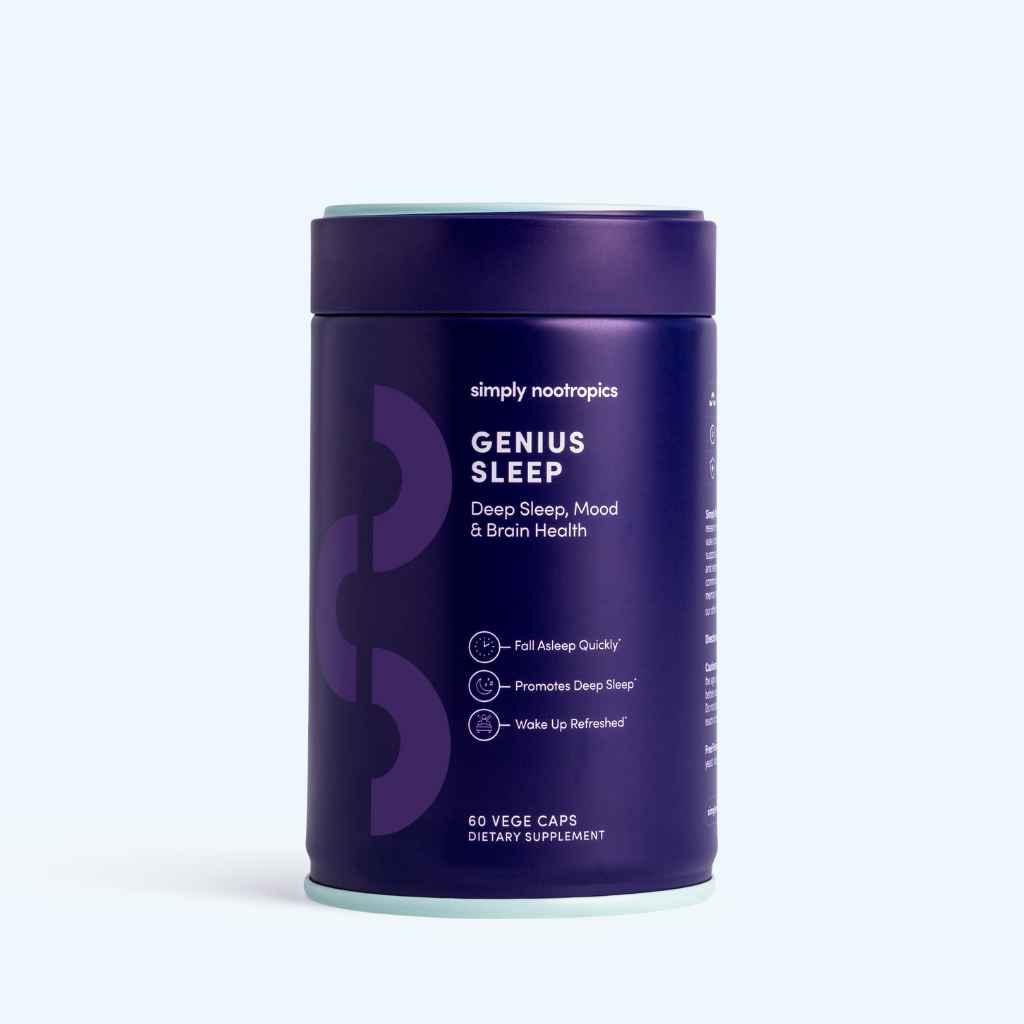Your body may be resting, but your mind is not. Your night brain seems to have a life of its own, bringing sweet dreams - and also terrible nightmares whose origins we often can't understand. Types of dreams and their meaning have long fascinated humanity, sparking numerous questions about their explanations, and significance. From Freud to Jung to your favourite online dream interpreter, we're all asking ourselves: why did I dream about taking my exams today (I graduated twenty years ago)?
Dreams are closely tied to the science of sleep and can reveal whether you're going through stressful situations or anxiety. Fortunately, establishing a specific bedtime routine can help you handle your night brain and experience restorative sleep. Although having nightmares is a universal human experience, there are ways to sleep better that will allow you to feel more recharged during the day. For example, a calm supplement might be one of the most effective ways to sleep better. But first things first: let's start with the science.
The Science of Sleep
Sleep is a complex process regulated by our body’s natural clock, and characterised by different stages, each with its own unique functions. The stage we are interested in is called REM - from “rapid eye movement” -, which is the phase where those nice dreams and terrible nightmares are being generated. This phase sees the brain buzzing with activity similar to when we're awake. Even though our bodies stay still during REM sleep, our minds come alive, painting vivid pictures of experiences, emotions, and sensations.
We’re not just talking about psychology stuff here; the REM stage serves a crucial physiological function beyond the realm of dreams. It's during this phase that memory consolidation occurs, as the brain processes and integrates the day's experiences, solidifying learning and cognitive function. Additionally, REM sleep plays a central role in emotional regulation, helping to process and make sense of complex feelings and experiences.
The REM phase of sleep is essentially a dynamic environment where the lines between reality and imagination blur, providing insights into the inner workings of the mind and supporting critical cognitive and affective functions. Comprehending the nuances of rapid eye movement (REM) sleep not only sheds light on the many types of dreams and their meaning, but also emphasises how important sleep is in forming our mental and emotional health.
Why Do We Dream?
The age-old question of why we dream has puzzled philosophers, psychologists, and scientists alike for centuries. While the exact purpose of dreaming remains elusive, various theories and hypotheses have emerged to understand the various types of dreams and their meaning.
From Sigmund Freud's psychoanalytic interpretations to contemporary cognitive perspectives, researchers have proposed diverse explanations for the origins of the many types of dreams and their meaning. Some suggest that dreams serve as a mechanism for processing emotions and memories, while others view them as a means of problem-solving or wish fulfilment. Which theory is the correct one? We still don’t have an answer for that.
What Our Dreams Say About Our Health
We understood how dreams often serve as a window into our subconscious mind, reflecting not only our innermost thoughts and emotions but also our physical well-being. While dreams are commonly associated with psychological aspects, they can also offer valuable insights into our overall physical and emotional wellness.
For instance, having nightmares about falling or being chased may not only indicate feelings of insecurity or fear but also suggest underlying stress that can impact our physical health. Stress is known to have adverse effects on the body, contributing to a range of health issues such as high blood pressure, weakened immune function, and digestive problems.
Similarly, dreams about flying or achieving success can signify more than just confidence and ambition; they may also reflect a sense of vitality and well-being. Studies have shown that individuals who report having positive dreams tend to experience better physical health outcomes, including lower levels of inflammation, improved cardiovascular health, and enhanced immune function. On the other hand, having nightmares and distressing dreams has been linked to increased levels of stress hormones in the body, which can negatively affect various physiological systems.
Why Are You Having Nightmares?
We have been talking about dreams in general, but what often interrupts our restorative sleep is a nightmare. Nightmares are intense, disturbing dreams that evoke feelings of fear, anxiety, or terror, and they can have significant implications for both mental and physical well-being. From a physiological perspective, nightmares disrupt the normal sleep cycle, particularly during the REM (rapid eye movement) stage, which is when the brain becomes highly active and vivid dreaming occurs.
Having nightmares can trigger a physiological stress response, leading to increased heart rate, elevated blood pressure, and changes in breathing patterns. Chronic nightmares can disrupt sleep continuity, leading to sleep disturbances such as insomnia or excessive daytime sleepiness. Over time, poor sleep quality can take a toll on physical health, increasing the risk of cardiovascular problems, weakened immune function, and metabolic disorders.
From a psychological point of view, nightmares are often associated with unresolved emotional issues, trauma, or subconscious fears. For example, people who have experienced trauma or abuse may frequently experience nightmares related to their past experiences. At the same time, people with anxiety disorders or high levels of stress may also be more prone to having nightmares as their subconscious mind tries to cope with underlying emotional distress.
Of course, if “dreams can be considered an altered state of consciousness”, they have to be telling us about something going on within ourselves. For this reason, it could be beneficial to explore some techniques for analysing your dreams and understanding why you are having nightmares.
Dream Management and Tips for a More Restorative Sleep
Creating a relaxing bedtime routine, practising relaxation techniques such as deep breathing or meditation, and maintaining a healthy lifestyle can help reduce nightmares and promote better sleep hygiene. Therapeutic interventions, such as dream analysis, cognitive-behavioural therapy (CBT), and stress management techniques, can also be effective in addressing and understanding why you are having nightmares.
If restorative sleep is a must, and that’s why you might also consider a sleep nootropic as effective as Simply Nootropics Sleep Formula. This specialised blend is designed to enhance deep sleep phases, promoting optimal rest and recovery throughout the night. The Sleep Formula aids in supporting natural melatonin production, helping to regulate your sleep cycle for improved rest. The ingredients included in the formula are chosen for their abilities to promote a calmer and quieter mind at bedtime, and support heart health and performance, contributing to a restful and rejuvenating sleep experience. Take charge of your night routine today - after all, sleep hygiene is as important as good personal hygiene.














